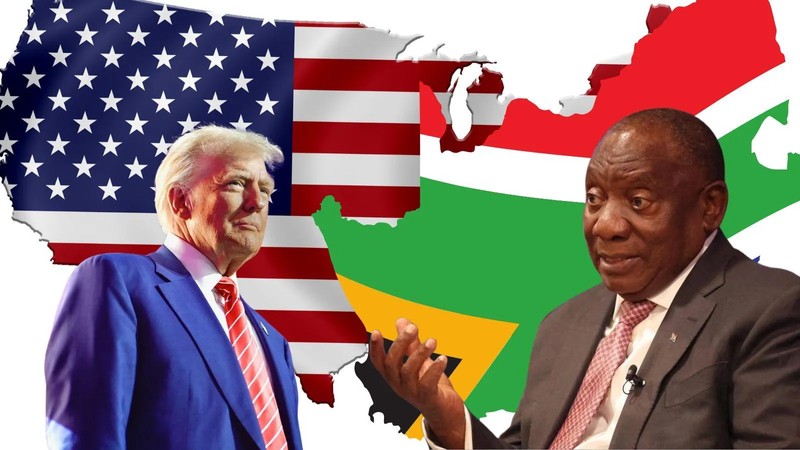Once a symbol of reconciliation and burgeoning partnership, the relationship between the United States and South Africa has recently been marred by misinformation, unfounded accusations, and diplomatic setbacks.
Under the Trump administration, decades of progress in fostering mutual respect and cooperation are being challenged, threatening to undo the hard-won gains of post-apartheid diplomacy.
A Legacy of Reconciliation
Historically, US-South Africa relations have evolved significantly since the end of apartheid in 1994.
During apartheid, the US imposed sanctions and diplomatic pressures to oppose racial segregation. In addition, it listed former President Nelson Mandela as a terrorist
However, Mandela’s release from prison and his subsequent leadership marked a turning point.
Mandela travelled widely, including to countries hostile to South African freedom fighters, emphasising reconciliation and building bridges.
However, experts told on Wednesday that the current US administration has damaged the friendship between the two nations.
“Mandela made sure to visit even those nations that had not supported our struggle during apartheid; these are countries that had been hostile to South Africa,” explains historian Khaya Ndwandwe.
“He believed in the power of diplomacy to transform enemies into partners, which laid the foundation for a relationship based on mutual respect and shared interests.”
He argued that post-apartheid, the US and South Africa worked together to rebuild diplomatic ties, grow trade, and promote democracy. South Africa emerged as a regional leader committed to reconciliation—a symbol of hope and progress.
The shift under Trump: misinformation and isolation
However, that progress has been under threat. Since Donald Trump took office, US actions have increasingly been driven by unfounded claims about South Africa, especially regarding allegations of “genocide” against the white minority.
These accusations have been widely dismissed by credible organisations, including the United Nations, but they have gained traction in US political discourse.
“The Trump administration has spread false claims about South Africa targeting white farmers,” says political analyst Joe Mhlanga.
“They claim genocide, but there’s no evidence to support that. It’s a political narrative designed to isolate South Africa.”
Other US administration accusations include criticisms of land reform policies and claims of systemic abuse against refugees—allegations often exaggerated or based on isolated incidents rather than facts.
These claims have been used to justify diplomatic boycotts, including Trump’s decision to skip the 2025 G20 summit, currently led by South Africa.
Diverging foreign policies
The US’s approach under Trump has been characterised by unilateralism and protectionism, contrasting sharply with South Africa’s emphasis on multilateralism and regional stability.
While South Africa advocates for dialogue and human rights, the US has resorted to threats, sanctions, and misinformation campaigns.
“America’s foreign policy now seems driven by short-term interests,” said Ndwandwe.
“They want to portray South Africa negatively to serve their political agenda, even if it means spreading falsehoods.”
Voices on the ground
Adding to this complex picture is Elon Musk, South Africa’s billionaire entrepreneur based in the US, who has been accused of fueling misinformation campaigns against his homeland.
Critics argue that Musk’s actions are motivated by business disagreements and personal interests rather than facts.
Meanwhile, Ndwandwe criticises US lawmakers’ intolerance for questioning.
“The US only accepts allies that don’t question its actions. If you raise concerns about military interventions or election meddling, they see it as a threat.
South Africa’s calls for accountability, particularly regarding Israel’s role in the Middle East, are often met with hostility. That’s why they’re being targeted now.”
The reality of US-SA relations
According to Mhlanga, the contradictions are stark. While South Africa pushes for multilateralism, transparency, and regional cooperation, the US under Trump has often prioritised secrecy, unilateral action, and misinformation.
“The US acts selectively. When allies criticise or question their actions, they’re punished. Like Israel, South Africa’s stance on global issues has made it a target,” said Mhlanga.
According to Ndwandwe, the recent misinformation and diplomatic isolation trend threatens to reverse years of progress. As Ndwandwe emphasised
“This is a setback for reconciliation and trust. We must counter these false narratives with facts and diplomacy.”
He stated that South Africa’s leadership faces the challenge of defending the truth amid political expediency.
He suggested that the future of US-South Africa relations depends on a return to honesty, mutual respect, and shared values—principles that should guide international diplomacy, not misinformation campaigns.
Politics
